#released 1995 & its student bands mostly i think
Explore tagged Tumblr posts
Text

just saying that if you ever find this cd anywhere you should give it a listen it goes hard
#dunedin sound#not dunedain hehe#nz music#released 1995 & its student bands mostly i think#if i get a chance i'll digitise it#couldnt find it online but tbf didnt look toooo hard
9 notes
·
View notes
Text
It’s still the 70s, but with more guitar
Across from Punk, the way the guitar was being utilized was starting to formulate more intricate like and kick ass than ever before. Becoming the center piece, the shift into guitar chops would see prominence in such classics as Ram Jam’s Black Betty.
youtube
At some point, guitar solos had started to become a rite of passage. It’s not the first time guitar mastership was introduced, but it certainly became a mainstay into rock and the newly developed Metal genre.
youtube
Crazy Train - Ozzy Osbourne (1980)
Randall “Randy” Williams Rhoads (1956 - 1982)

Randy was an American heavy metal guitarist who played with Quiet Riot and Ozzy Osbourne. A devoted student of classical guitar, Rhoads combined his classical music influences with his own heavy metal style. He died in a plane accident while on tour with Osbourne in Florida in 1982. Despite his short career, Rhoads, who was a major influence on neoclassical metal, is cited as an influence by many guitarists. Rhoads is included in several "Greatest Guitarist" lists.
Source: Wikipedia
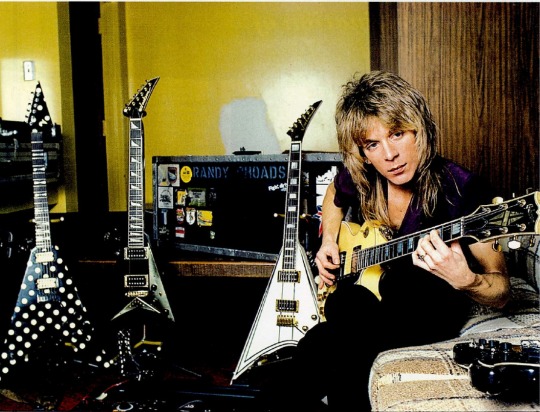
Randy with his collection of signature Jackson Flying V guitars and his Gibson Les Paul.
There was a major boom in the U.K. that took place as early as the 1960′s when many associated artists and acts would take inspiration from the U.S. and the Blues music. This would lead into the New Wave of British Heavy Metal or in acronym, N.W.O.B.H.M. Punk scenes were taking place in most the world in the emerging 1970s. Bands such as The Beatles and Led Zeppelin have gone on record to have stated taking great strides from Blues musicians such as Muddy Waters.
The new wave of British heavy metal (commonly abbreviated as NWOBHM) was a nationwide musical movement that started in the United Kingdom in the late 1970s and achieved international attention by the early 1980s. Journalist Geoff Barton coined the term in a May 1979 issue of the British music newspaper Sounds to describe the emergence of new heavy metal bands in the mid to late 1970s, during the period of punk rock's decline and the dominance of new wave music.
Source: Wikipedia
youtube
Phantom of the Opera (2015 Remaster) - Iron Maiden (1980)
Of cultural importance the band would create their songs based around historical events. To think that I have learned a bit more about world history from Iron Maiden than some of my own school history textbooks is quite exemplary of the band. The stories told in these songs are taken from real world events. One such song would be Run to the hills. A song which explains the colonialism of the Americas and the brutal ways the Colonists established territory fighting the indigenous natives. I can only imagine textbooks these days gloss over such pivotal moments in world history.
youtube
Run to the Hills (1998 Remaster) - Iron Maiden (1985)
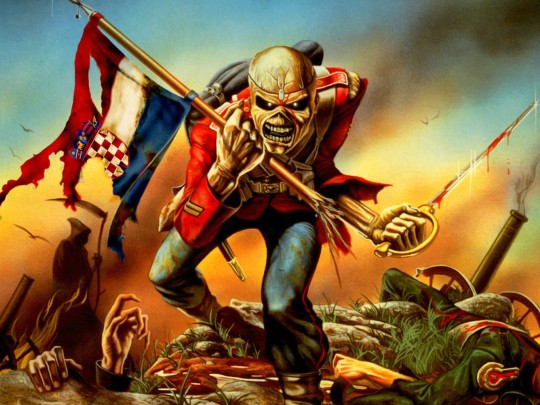
Eddie, the iconic character from Iron Maiden. He is often depicted in the real world events that Iron Maiden bases their songs on. This one is The Trooper, reference to the Charge of the Light Brigade at the Battle of Balaclava 1854, which took place during the Crimean War.
Meanwhile back in the U.S. another band would help establish the guitar’s role to shape the Rock and Roll landscape.

The original Van Halen logo as seen on their debut self titled album.
Van Halen is an American hard rock band formed in Pasadena, California in 1972. Credited with "restoring hard rock to the forefront of the music scene", Van Halen is known for its energetic live shows and for the work of its acclaimed lead guitarist, Eddie Van Halen. The band was inducted into the Rock and Roll Hall of Fame in 2007.
Source: Wikipedia
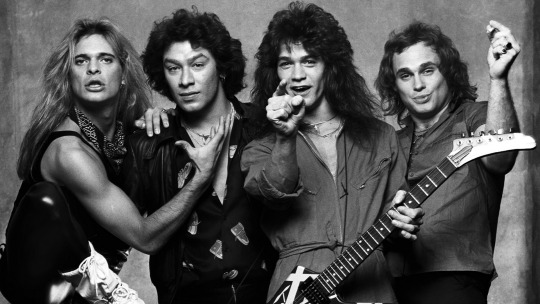
From left to right David Lee Roth, Alex Van Halen, Eddie Van Halen, and Michael Anthony.
From 1974 until 1985, Van Halen consisted of Eddie Van Halen; Eddie's brother, drummer Alex Van Halen; vocalist David Lee Roth; and bassist Michael Anthony. Upon its release, the band's self-titled debut album reached No. 19 on the Billboard pop music charts. By the early 1980s, Van Halen was one of the most successful rock acts of the time. The album 1984 was a hit; its lead single, "Jump", is the band's only U.S. number one single to date and was internationally known.
Source: Wikipedia

In 1985, Van Halen replaced Roth with former Montrose lead vocalist Sammy Hagar. With Hagar, the group released four U.S. number-one albums over the course of 11 years (5150 in 1986, OU812 in 1988, For Unlawful Carnal Knowledge in 1991, and Balance in 1995). Hagar left the band in 1996 shortly before the release of the band's first greatest hits collection, Best Of – Volume I. Former Extreme frontman Gary Cherone replaced Hagar, remaining with the band until 1999; Van Halen then went on hiatus until reuniting with Hagar for a worldwide tour in 2003. The following year, the band released The Best of Both Worlds, its second greatest hits collection. Hagar again left Van Halen in 2005; in 2006, Roth returned as lead vocalist. Anthony was fired from the band in 2006 and was replaced on bass guitar by Wolfgang Van Halen, Eddie's son. In 2012, the band released the commercially and critically successful A Different Kind of Truth.
As of March 2019, Van Halen is 20th on the RIAA list of best-selling artists in the United States; the band has sold 56 million albums in the States and more than 80 million worldwide, making them one of the best-selling groups of all time. As of 2007, Van Halen was one of only five rock bands with two studio albums that sold more than 10 million copies in the United States. Additionally, Van Halen has charted 13 number-one hits in the history of Billboard's Mainstream Rock chart. VH1 ranked the band seventh on a list of the top 100 hard rock artists of all time.
Source: Wikipedia

The change in lineup during the Hagar era was viewed as one of the most controversial and most discussed among music fans over the years. A lot of of original fans turned their backs and retaliated against the new singer. Sammy has still not felt any malice since joining and leaving the band. And personally, I grew up with the album 5150 first. I thought it was really great among some of the David Lee Roth era material as well. I really dig both singers for what they brought to the band. But no matter what, when you set the bar a certain height, filling in that role will always be a major undertaking. When I listened to their earlier songs such as I’m the one, Ice Cream Man, and Romeo Delight really capture the band in it’s purest form. And then along came the most sought after guitar solo ever captured in history.
youtube
The outrageous barrage of notes as it’s come to be known is the mighty behemoth, the unmistakable, the renowned Eruption written by Eddie Van Halen. Once this solo was released, all Hell broke loose. Everybody wanted to get in on that guitar shred goodness. Funny thing is though, the word Shred wouldn’t even be a household name until mid to late 80′s.
It goes without saying that every guitarist at some point has heard of or knows of Eddie Van Halen. I think Eruption was the biggest monument attributed to that. And I just like every other kid would hear this for the first time and would just be blown away and ignited to dedicate my guitar chops. Which would be beneficial to up and coming musicians willing to go the distance.
Diver down will always be my favorite album, mostly because it features two guitar solos. And if you enjoyed Eruption, you absolutely will love Cathedral and Spanish Fly.
I kinda took Diver down as a format for my own first released album, Allegro. Opening with a guitar solo, and having some (poorly recorded) Heavy Rock tracks ending in a final guitar solo.
Since we’re discussing Van Halen’s legacy, I would be remiss if I left out the history post Van Halen and David Lee Roth’s solo project, A little ain’t enough.
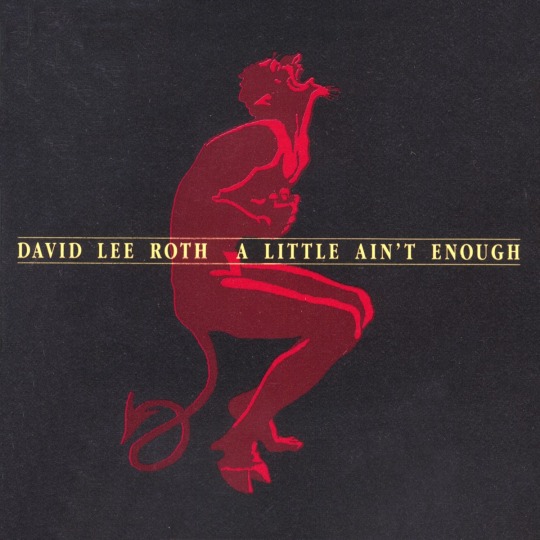
So based off of what I personally know, David splits from VH, and starts his own side project in late 80s till 1990. He looks around for guitarists. By some miracle he finds Jason Becker. I’ll go deeper in a detailed entry about Jason, but know this; Jason left his own band Cacophony to release a solo album and sent Roth in a demo tape. Dave liked what he heard and immediately signed Jason on contract to record A little ain’t enough. The recording has been completed and Jason is set to tour to promote the album. Except, health complications prevented Jason from attending rehearsals and eventually from the tour at the advice of his doctor. He had been diagnosed with ALS (Ameotrophic Lateral Sclerosis, aka Lou Gehrig’s Disease). The album’s tour tanked in live shows and marked Roth’s decline in commercial success.
The demo that Jason sent in was actually a cover of Yankee Rose, the guitarist on the original track was Steve Vai.
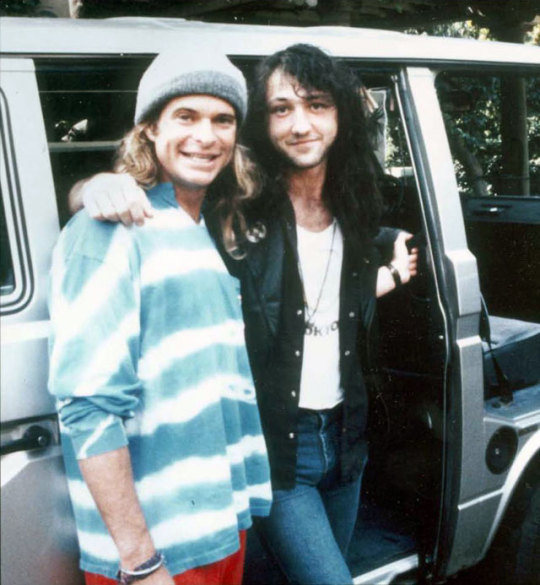
2 notes
·
View notes
Text
Down Is The New Up: Radiohead’s EP’s, Remixes, Remasters, and Live Albums
Drill (1992)
This release became the first one ever from Radiohead, which at the time of its recording were still calling themselves On a Friday. Two of the songs would be re-recorded for their debut album Pablo Honey including “Thinking About You” and “You.” The song “Stupid Car” would foreshadow a continuing theme within Thom Yorke’s lyrics about his hatred of transportation. This extended play would peak at 101 on the UK charts, while they only recently allowed streaming services access to it in 2020.
My Iron Lung (1994)
This extended play featured songs not included on their second studio album The Bends, except for “My Iron Lung.” Yorke would not describe the songs on this release as not good enough for the studio effort. “The EP was just for fans, really ... It's for Radiohead fans and we think they're good, otherwise we wouldn't have plugged them on." This also marked the first collaboration between the band and artist Stanley Donwood, as well as Nigel Godrich. The title track possessed lyrics that were in direct response to their biggest hit, “Creep.” The song was meant to symbolize their signature hit was much like an iron lung that allowed you to breathe, but constrained you at the same time. Yorke said in 1995, “People have defined our emotional range with that one song, 'Creep'. I saw reviews of 'My Iron Lung' that said it was just like 'Creep'. When you're up against things like that, it's like: 'Fuck you.' These people are never going to listen.” The sales of the EP proved that Radiohead would be something more than just a one hit wonder because they were attracting a very loyal group of fans. Critics were confused at first by the EP, but once The Bends was released the songs made a lot more sense. One review would say that My Iron Lung actually came off more like an album, rather than a group of b-sides.
No Surprises/Running from Demons (1997)
The main reason for the release of the EP was to support Radiohead's tour of Japan in 1998. The track “Meeting in the Aisle” would represent the band's first ever fully instrumental song. The song “Bishop's Robes” had lyrics that focus on the theme of cruelty that Yorke experienced while in school. He was talking about mental mind games played by both students and teachers alike, but nobody actually ever harmed the young singer physically.
Airbag/How Am I Driving? (1998)
This record collected in one compilation all of the b-sides for the 1997 album, OK Computer, as well as the track “Airbag.” The EP would debut at number 56 on the Billboard charts, which seemed rather miraculous considering that the release is only 25 minutes long. The record was also nominated for Best Alternative Performance at that year’s Grammys. The instrumental track “Meeting in the Aisle” would not be played live by the band for over 10 years until The King of Limbs tour in 2012.
Com Lag (2plus2isfive) (2003)
This work compiles all of the b-sides for the 2003 album Hail to the Thief, as well as live performances that remixed their songs from Fourtet and Cristian Vogel. The track “Paper Bag Writer” represented a direct reference to the Beatles track, “Paperback Writer.” The song “Bluebird,” which existed as an instrumental would become the band’s introduction music for the Hail to the Thief Tour. Reviews of the release were mixed, but you can always take that with a grain of salt regarding their extended plays because of the presence of the b-sides on them. Pitchfork would write, “You'd expect more from ideas that Radiohead fleshed out as a unit, but the stolen-time experiments and solo performances on this EP's tail end far outshine its exhausting first half."
TKOL RMX 1234567 (2011)
This remix album acts as the only one of its kind in the band's entire catalog. The release compiled remixes of The King of the Limbs album with electronic artists such as Jamie xx, Nathan Fake, Four Tet, Caribou, Modeselektor and SBTRKT. Drummer Philip Selway would comment that this record seemed to stand out as the best one to incorporate such a remixing project. Thom Yorke observed, “I didn’t just want floor-fillers and all that shit, I just wanted to see how the songs could really branch out and mutate." Reviews of the album were mixed as some critics saw it as an interesting take on Radiohead, while others thought it sounded a bit repetitive and redundant. The Guardian would write that the entire venture seemed a bit pointless to have Fourtet or Caribou remix tracks that were intended to sound like them in the first place.
OK Computer OKNOTOK 1997 2017 (2017)
To celebrate the 20th anniversary of OK Computer, Radiohead reissued it with this remastered version that also included besides and three unreleased tracks, "I Promise", "Man of War", and "Lift". This release represented the first reissue authorized by the band because other ones had come from EMI without their consent. In 2016, their new label XL recordings purchased the band’s back catalog from the group’s former label. The album debuted at number two on the UK Album Charts and number 23 on the US charts. The record would be dedicated to Tom Yorke’s longtime partner Rachel Owen, who had recently passed away from cancer.
MiniDiscs [Hacked] (2019)
This album serves as a compilation of 16 hours of demos, outtakes, rehearsals, and live shows of the band during the recording of OK Computer. The recordings were actual minidiscs that belonged to lead singer Thom Yorke. Some of the tracks had been previously released as part of the reissue in 2017. In June 2019, an online user name Zimbra leaked the tracks online. The user claimed to have fairly received the recordings through a trade for some Beatles tracks, but Ed O’Brien thought that they had actually been stolen through their cloud archive online. Originally, Zimbra had wanted $150,000 for the recordings. There were conflicting stories as to who he wanted to pay that sum. According to Pitchfork, he was not trying to get money from the band, but only from fans. As the band received news of the leak, they posted them on Bandcamp for 18 days to stream or buy. Any money made from it went to the environmental nonprofit, Extinction Rebellion. Thom Yorke said this about the release. “As it's out there it may as well be out there until we all get bored and move on.” Jonny Greenwood would comment that people would find it only “tangentially interesting.” Many critics agreed with his assessment as they felt that MiniDiscs would only be of interest to the most diehard of Radiohead fans. The Guardian had this to say about the release. “[It shows] the inner workings of what is regarded by many as the greatest album of the 1990’s, showing how they walked alongside and then turned away from the brash Britpop that surrounded them."
I Might Be Wrong: Live Recordings (2001)
This live compilation was taken from the Amnesiac tour in 2001. The songs on it have been mostly taken from both Kid A and Amnesiac. The one exception emerges in “True Love Waits,” which had not appeared on any studio album until A Moon Shaped Pool in 2016. Critics mostly liked the album, but their main complaint across the board was the fact that the album at 40 minutes long seemed much too short. The AV Club would refer to it as “inexplicable brevity.” Andrew Lynch of entertainment.IE was much more complimentary. “Unlike most live albums, this one captures some of the excitement of actually being there and gives Radiohead back the human dimension they've recently been in danger of losing."

0 notes
Text
A Brief History of Japanese Chillout & Downtempo
It’s no secret that Japan has produced some of the finest meditative sounds. From the environmental music of Hiroshi Yoshimura to the warm synths of Haruomi Hosono, blissed-out electronics have been surfacing since the 1980s and have continued to evolve through to the present day.
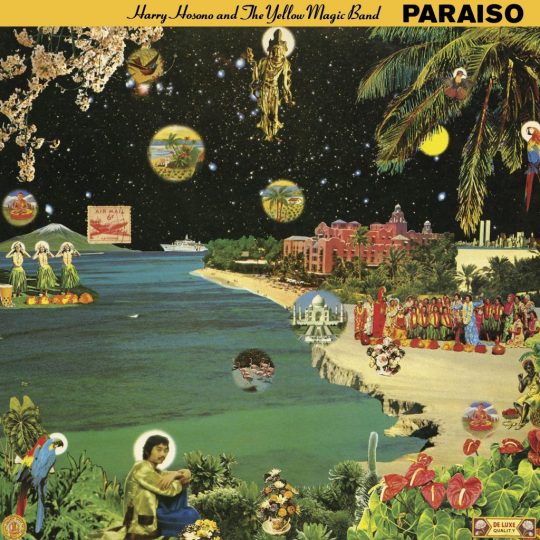
Ken Hidaka, Max Essa and Dr. Rob are three friends and deep digging collectors who’ve been immersed in these sounds for years, be that through writing, DJing or throwing their long-running monthly listening party at Bar Bonobo in Harajuku.
In 2017, whilst in Copenhagen on tour with Midori Takada, Ken visited the home of Kenneth Bagger – the boss behind Copenhagen-based imprint Music For Dreams – who asked him if he’d lead the charge for an instalment of their Collectors Series. Enlisting the help of Max and Dr. Rob, the trio spent the next three years charting the history of Japanese chillout and downtempo music from the 80s through to 2018. Titled Oto No Wa: Selected Sounds of Japan 1988 – 2018, each track is the result of friendships and physical connections, mapping out the development of chilled sounds, from ambient to electro-acoustics, post-house and balearic.
Alongside a mix of Japanese chillout and downtempo from Dr.Rob, we asked him, Ken and Max to discuss some of their personal favourites.
Oto No Wa is out now on Music For Dreams.
Where does your love for Japanese Chillout stem from?
Ken Hidaka: For me, it was when I heard the Silent Poets: Moment Scale (Dubmaster X Remix), the first track on Jose Padilla compiled Cafe Del Mar- Volumen Dos. Not sure where I bought this compilation as I was in between living in London and in Tokyo around the time of when this compilation was released in 1995. At the time, to be honest with you, I was way more into western club music and really not much into Japanese music at all so this Silent Poets’ track in this compilation surprised me a lot!
Although my tastes for music were still leaned towards mostly western club music, after coming back to Japan, I slowly started to discover a few Japanese music that caught my interest. Artists that released music out of Bellissima Records at the time such as Nobukazu Takemura’s Child’s View, Reflection out of Lollop (their debut album, The Errornormous World was also released out of Clear in the UK), Major Force crew, etc. You could say that my roots for Japanese down tempo/ chill-out music stem from Jose Padilla and his Balearic aesthetics, Club Jazz sounds and electronic music that was emerging from Japan.
What Japanese Chillout record has left the biggest impression on you as a DJ, and why?
Rob Harris: As a DJ, I don’t know, but as someone passionate about recorded music, a student of sound, I can give you two Japanese, downtempo / chill out records that made a big impression on me.
The first is Haruomi Hosono’s Paraiso. When I lived in Tokyo, which is about ten years ago now, I spent a lot of time digging for vinyl. Using the second-hand stores as an excuse to get to know the city, and searching for stuff, both for my own collection and to sell. Paraiso was one of the things on my “wants list”. It was on there because Jose Padilla, the former DJ at Ibiza’s Cafe Del Mar, had mentioned it in a radio interview. Even back then this album wasn’t so easy to find. It wasn’t expensive because the boom in Japanese music was still off on the horizon but there didn’t seem to be that many copies around. Produced in 1978, maybe it hadn’t been issued on CD, and those folks with were hanging onto their copies.
Anyhow when I did find one I didn’t know what to make of it – why was it in Jose’s favourites? I’d already hoover-ed up most of the Yellow Magic Orchestras output – the band Hosono founded with Yukihiro Takahashi and Ryuichi Sakamoto – for its chugging electronic afro / cosmic crossovers, but this was acoustic guitar-driven, softly strummed singer-songwriter stuff. But then bumping the needle, scanning from track to track, I hit the title number and understood – as Hosono-san used studio effects to deconstruct the song – send it into the stratosphere. Mid-way through it just dissolved into sonic shimmer, like a passing comet’s tail. Creating an extra-terrestrial exotica – an easy-listening muzak with its sights set not on Hawaii but the stars.
The second record is Sth. Notional’s ‘Yawn Yawn Yawn’. For me this is a defining Japanese downtempo / chill out release. Again it was a favourite of Jose’s – but I only learned that in hindsight. It was Mancunian balearic guru, Richard “Moonboots” Bithell who tasked me with finding a copy. His London-based counterpart, Phil Mison, had one and he didn’t. This record was and still is super rare, since it was made in the early-90s, and kinda opposite to Paraiso, was far more abundant on CD. But then the CD didn’t have all the mixes. Jose and Phil had both championed the break-driven G-Tar Canyon Mix at the Cafe Del Mar, but it was Moonboots who picked up on the Dream… Another Reality version – which is an eight and a half minute meditation of sampled shore-line, piano and poetry. A hippie ode to Mother Nature – which to the West might sound cheesy – but captures a spirituality that exists in everyday Japan – something you only really appreciate, learn to respect, and hopefully come to understand, by living here. These are largely islands of gentle souls.
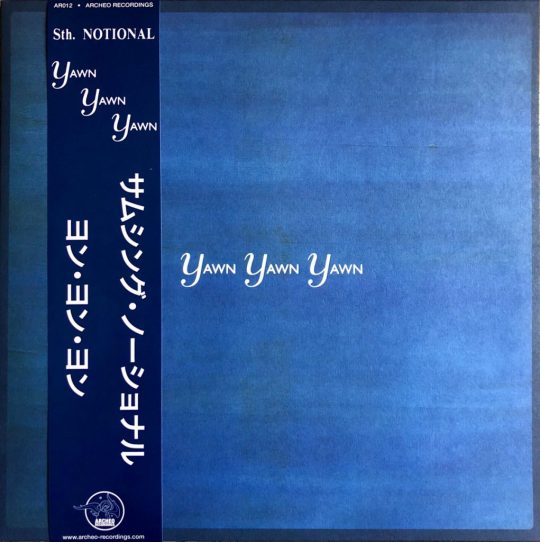
Moonboots later put this mix on his Originals compilation – co-selected with “Balearic” Mike Smith – for Claremont 56. I can’t tell you how ecstatic I was when I came across the record’s sea-blue sleeve in a rack labelled “Major Force & Friends” in Shibuya`s Recofan. I was seriously in double-take shock. To date I’ve only ever found three copies of the OG. Yawn Yawn Yawn was however reissued by Italy’s Archeo Recordings in 2018. The package expanded by a host of new remixes, and spread across six sides of vinyl. Reworks by Max Essa, Chee Shimizu, and Kuniyuki Takahashi. The update by Tadashi Yabe – ex of Untied Future Organization – is truly amazing. It’ll catch you off-guard. A fucked-up funky, psychedelic collage that – I’ll stick my neck out here – is the best Japanese “balearic” track of modern times. In my opinion if you only own one Japanese downtempo / chill out record then this Archeo reissue of Sth. National’s Yawn Yawn Yawn should be it.
What Japanese Chillout record has made the biggest impact on your sound as a producer, and why?
Max Essa: It’s difficult to single out one particular record, but I’m going to go with ‘Julia’ by Seigen Ono from the Comme Des Garçons Volume Two LP (1989). I got my first break making records in the early 90s through house music. Dance music genres/sub-genres are very rigid stylistically. When one is making those kind of records you can’t just make something that exists purely because it’s a beautiful, emotive, powerful piece of music, it ‘has to be’ a certain tempo, it has to have a 4/4 kick drum etc etc. This is the way I ended up thinking when I approached making music and I thought like that for many years!
I remember hearing ‘Julia’ for the first and being utterly charmed by it. It’s a very elegant piece that combines a calming tranquility with an ever so slightly mysterious, emotional undertow. The effect it had on my own approach to making music was to make me place far more value on the music for it’s own sake. I wanted to start creating music, moments, combinations of sounds that appealed beyond dance floors, DJs, beat-mixing.
0 notes
Text
Twenty Years Later, '10 Things I Hate About You' Is More Relevant Than You'd Expect
For me and all the other mid-80s millennials, 1999 didn’t signal the end of an era. It was the start of our definitive teenage years, rich with all the compulsive hormone-driven drama that would ultimately shape us into the adults we went on to become.
1999 was the year I started high school; the year that I got what was, at the time, a state-of-the-art three-CD player on which I blasted TLC’s FanMail, Backstreet Boys’ Millennium, and Sugar Ray’s 14:59 on endless loop. It’s also the blessed year that 10 Things I Hate About You was released.
I’m guessing many adolescent girls—and boys, for that matter—at the time could relate to at least one of the characters in 10 Things I Hate About You. There was quippy sidekick Michael (David Krumholtz), doe-eyed and floppy-haired new kid Cameron (Joseph Gordon-Levitt), effortlessly and often infuriatingly twee Bianca (Larisa Oleynik), the tragically underrated Mandella (Susan May Pratt), and of course, the mewling, rampallian wretch herself, Kat (Julia Stiles).
Like Kat, I existed on the fringes of my fairly affluent, mostly white public school’s society, although my banishment was less self-inflicted than hers. Yes, I haunted bookstores in my spare time and plastered my room with torn-out pages from Bust Magazine and dELiA*s catalogs, but I was neither thin, blond, or a voluntary member of any sports team. I couldn’t understand how someone who could effortlessly bare an enviably toned midriff be so bold as to snub male attention, which was the only type of attention I craved as a swarthy 13 year old who had yet to be kissed.
But her defiance of conventional feminine attitudes captivated me. The idea that one could subscribe to their own ideals rather than conform to anyone else’s expectations was a completely new concept in a time when teenage self-discovery was only just taking root. I did give a damn ‘bout my reputation… but maybe I didn’t have to.
In 1999, Kat’s brand of feminism seemed pretty extreme. But looking back on it 20 years later, it’s surprising how mainstream certain aspects of it now come across.
“Every time I watch this movie Kat seems more and more relatable,” explains Sarah Barson, co-host of Bad Feminist Film Club, a podcast that reviews movies through a feminist lens. “At the time this movie came out, I think Kat was supposed to be a super ‘out there’ radical feminist, but the stuff she talks about feels very relevant to modern conversations about pop culture and a woman's right, or even responsibility, to speak up and challenge social norms.”
But according to 10 Things I Hate About You writers Karen McCullah and Kirsten “Kiwi” Smith, Kat may have ended up differently if written for today’s audience.
“I think Kat would have to have a more extreme form of rebellion,” says Smith. “We’d have to dig her even further into a counter-culture, because in that era, it was all pretty simple.”
Rather than merely dreaming of playing in a riot grrrl band, Smith says Kat would’ve already been shredding on her pearly white Stratocaster, playing her angsty songs at different gigs. Had 10 Things been written in 2019, McCullah sees a version of Kat that’s more in touch with the activism of today’s teens.
“Like, kind of the Parkland student vibe, I think. We would add a little bit more of that,” she says. ”I think those kids are amazing, what they’re accomplishing. When I think of teenagers right now, that’s where my brain goes first.”
Smith agrees. “That’s a good point, yeah. When we wrote it, we were kind of in a freewheeling 90s bubble, not really thinking about the larger world around us. Now, as Karen pointed out, the experience of the youth is much different. They’re much more global in their thinking than we were.”
10 Things I Hate About You has its share of shortcomings, although it’s held up better over time than other teen flicks of previous eras, like Sixteen Candles. I’m willing to bet that a fresh audience today wouldn’t laugh quite as hard when Kat flashes her soccer coach to help Patrick (Heath Ledger) sneak out of detention—even with his swoon-worthy dimples—or let it slide when Bianca drops the R-word during an argument with Kat. And let's not forget how “nice guy” Cameron manipulated the entire love triangle just so he could have a shot with the younger Stratford sister. Oof.
Even so, the characters' relationships with one another and even their personal shortcomings hold up relatively authentically in a way that few other movies have been able to accomplish.
“The Craft was the perfect movie for any woman who felt disenfranchised, and Never Been Kissed really did stress the importance of self-confidence and self-acceptance, but 10 Things I Hate About You was about real characters to whom average women could relate,” says Dr. Randall Clark, author of At a Theater Or Drive-In Near You: The History, Culture, and Politics of the American Exploitation Film and associate professor of Communication and Media Studies at Clayton State University.
Dr. Clark’s students have expressed surprise that Kat was open about her sexual experience and yet managed to escape some of the consequences that society tends to heap upon young women who have sex at what they consider to be a young age.
“It was just a fact of her life,” he says, giving credit to the movie for being “not at all judgmental about her past.”
The filmmakers’ non-superficial portrayal of an unapologetic and (one-time) sexually active feminist was a groundbreaking achievement at a time when few other feature films even dared to explore the complexities of teen girl relationships. In the 90s, and to some extent today, feminism is often mistakenly equated with man-hating, an idea that both writers resoundingly reject.
“Feminists need love too!” laughs Smith.
Earlier teen-centric comedies like 1995’s Clueless helped lay the groundwork for 10 Things by weaving together real-life scenarios with tongue-in-cheek banter that managed to entertain, but also illuminate some of the basic pillars of modern-day feminism. The fact that both are remakes of classics— Clueless being a contemporary version of Jane Austen’s Emma and 10 Things I Hate About You being a modern adaptation of William Shakespeare’s The Taming of the Shrew—that revolve around young women with BIG personalities makes perfect sense. Women finding their place in the world, and being tamed by men, is by no means a novel idea.
But one thing that many of these iconic films of the late 90s and early 2000s lack is a sense of intersectionality. Bad Feminist Film Club co-host Kelly Kauffman cites Bring It On as one example of film from this era that addresses issues of race and class that other films—including 10 Things—shied away from.
“There's definitely some parts that haven't aged as well, but on a recent rewatch, I was struck by how the movie [Bring It On] touched on sensitive issues that most mainstream movies try to actively avoid,” says Kauffman.
10 Things I Hate About You may have helped shape the modern definition of “girl power” and inspired movies like Bend It Like Beckham to depict alternative stereotypes of femininity, but it’s not perfect. The one major theme I find particularly problematic upon rewatching is the apparent lack of understanding about consent throughout the film. Kat and Bianca’s father Walter (Larry Miller) doesn’t seem to grasp the concept that sex tends to occur between two people choosing to participate. His fears are clearly distorted for comic effect, but his misguided worldview holds his daughters hostage (as Bianca points out) rather than holding their partners accountable.
This concept extends to the prom scene when Bianca’s BFF-turned-nemesis Chastity (Gabrielle Union) smugly informs Bianca that pretty boy villain Joey (Andrew Keegan) “was gonna nail you tonight,” as though Bianca wouldn’t have had a choice in the matter. Then there’s the entire plot of the film’s inspiration: in The Taming of the Shrew, multiple men scheme and plot over who could obtain the most submissive, docile wife.
But the writers are adamant that the idea of “taming” doesn’t carry over to the film.
“I think at the end of the movie, you never get the sense that her character is going to be controlled by Patrick, in terms of Taming of The Shrew,” says McCullah. “Obviously, she’s not tamed and we don’t think Patrick is the type of guy who would want to control her. That’s why she likes him.” She goes on to call him an ally, or at least a prototype for one.
Seeing a privileged angry white girl like me grapple with trust, relationships, and finding herself inspired me to follow a more unconventional path in my own right. By the end of 1999, I had moved from Sugar Ray to crust punk, spiked my hair, and amassed a collection of ballpoint pen-decorated Chuck Taylors. I eventually dabbled in dating and going to art school, although I unfortunately never did start a band. But seeing someone chase her unorthodox dreams in a world designed to stifle misfits allowed me to dream outside the box in a way I'd never been shown before.
Compared to 2019, 1999 was a relative vacuum of women in media. “There were not a lot of female writing teams when we first started,” recalls Smith. “Now it seems like the appetite for female voices and female-fronted stories is ever-expanding."
Movies like Mad Max: Fury Road and Captain Marvel, with Brie Larson starring in Marvel’s first female-fronted superhero film, prove that we’ve come a long way with female representation. Both Smith and McCullah hope the trend continues, both in their future work, in the entertainment world at large, and with the resonating impact of 10 Things I Hate About You.
As McCullah says, “I hope it keeps inspiring young girls to be badasses and not let other people define them.”
Sign up for our newsletter to get the best of VICE delivered to your inbox daily.
Follow Beth Demmon on Twitter.
The post Twenty Years Later, '10 Things I Hate About You' Is More Relevant Than You'd Expect appeared first on .
The post Twenty Years Later, '10 Things I Hate About You' Is More Relevant Than You'd Expect appeared first on .
from WordPress http://www.richmegavideo.com/twenty-years-later-10-things-i-hate-about-you-is-more-relevant-than-youd-expect/
0 notes
Text
Twenty Years Later, '10 Things I Hate About You' Is More Relevant Than You'd Expect
For me and all the other mid-80s millennials, 1999 didn’t signal the end of an era. It was the start of our definitive teenage years, rich with all the compulsive hormone-driven drama that would ultimately shape us into the adults we went on to become.
1999 was the year I started high school; the year that I got what was, at the time, a state-of-the-art three-CD player on which I blasted TLC’s FanMail, Backstreet Boys’ Millennium, and Sugar Ray’s 14:59 on endless loop. It’s also the blessed year that 10 Things I Hate About You was released.
I’m guessing many adolescent girls—and boys, for that matter—at the time could relate to at least one of the characters in 10 Things I Hate About You. There was quippy sidekick Michael (David Krumholtz), doe-eyed and floppy-haired new kid Cameron (Joseph Gordon-Levitt), effortlessly and often infuriatingly twee Bianca (Larisa Oleynik), the tragically underrated Mandella (Susan May Pratt), and of course, the mewling, rampallian wretch herself, Kat (Julia Stiles).
Like Kat, I existed on the fringes of my fairly affluent, mostly white public school’s society, although my banishment was less self-inflicted than hers. Yes, I haunted bookstores in my spare time and plastered my room with torn-out pages from Bust Magazine and dELiA*s catalogs, but I was neither thin, blond, or a voluntary member of any sports team. I couldn’t understand how someone who could effortlessly bare an enviably toned midriff be so bold as to snub male attention, which was the only type of attention I craved as a swarthy 13 year old who had yet to be kissed.
But her defiance of conventional feminine attitudes captivated me. The idea that one could subscribe to their own ideals rather than conform to anyone else’s expectations was a completely new concept in a time when teenage self-discovery was only just taking root. I did give a damn ‘bout my reputation… but maybe I didn’t have to.
In 1999, Kat’s brand of feminism seemed pretty extreme. But looking back on it 20 years later, it’s surprising how mainstream certain aspects of it now come across.
“Every time I watch this movie Kat seems more and more relatable,” explains Sarah Barson, co-host of Bad Feminist Film Club, a podcast that reviews movies through a feminist lens. “At the time this movie came out, I think Kat was supposed to be a super ‘out there’ radical feminist, but the stuff she talks about feels very relevant to modern conversations about pop culture and a woman's right, or even responsibility, to speak up and challenge social norms.”
But according to 10 Things I Hate About You writers Karen McCullah and Kirsten “Kiwi” Smith, Kat may have ended up differently if written for today’s audience.
“I think Kat would have to have a more extreme form of rebellion,” says Smith. “We’d have to dig her even further into a counter-culture, because in that era, it was all pretty simple.”
Rather than merely dreaming of playing in a riot grrrl band, Smith says Kat would’ve already been shredding on her pearly white Stratocaster, playing her angsty songs at different gigs. Had 10 Things been written in 2019, McCullah sees a version of Kat that’s more in touch with the activism of today’s teens.
“Like, kind of the Parkland student vibe, I think. We would add a little bit more of that,” she says. ”I think those kids are amazing, what they’re accomplishing. When I think of teenagers right now, that’s where my brain goes first.”
Smith agrees. “That’s a good point, yeah. When we wrote it, we were kind of in a freewheeling 90s bubble, not really thinking about the larger world around us. Now, as Karen pointed out, the experience of the youth is much different. They’re much more global in their thinking than we were.”
10 Things I Hate About You has its share of shortcomings, although it’s held up better over time than other teen flicks of previous eras, like Sixteen Candles. I’m willing to bet that a fresh audience today wouldn’t laugh quite as hard when Kat flashes her soccer coach to help Patrick (Heath Ledger) sneak out of detention—even with his swoon-worthy dimples—or let it slide when Bianca drops the R-word during an argument with Kat. And let's not forget how “nice guy” Cameron manipulated the entire love triangle just so he could have a shot with the younger Stratford sister. Oof.
Even so, the characters' relationships with one another and even their personal shortcomings hold up relatively authentically in a way that few other movies have been able to accomplish.
“The Craft was the perfect movie for any woman who felt disenfranchised, and Never Been Kissed really did stress the importance of self-confidence and self-acceptance, but 10 Things I Hate About You was about real characters to whom average women could relate,” says Dr. Randall Clark, author of At a Theater Or Drive-In Near You: The History, Culture, and Politics of the American Exploitation Film and associate professor of Communication and Media Studies at Clayton State University.
Dr. Clark’s students have expressed surprise that Kat was open about her sexual experience and yet managed to escape some of the consequences that society tends to heap upon young women who have sex at what they consider to be a young age.
“It was just a fact of her life,” he says, giving credit to the movie for being “not at all judgmental about her past.”
The filmmakers’ non-superficial portrayal of an unapologetic and (one-time) sexually active feminist was a groundbreaking achievement at a time when few other feature films even dared to explore the complexities of teen girl relationships. In the 90s, and to some extent today, feminism is often mistakenly equated with man-hating, an idea that both writers resoundingly reject.
“Feminists need love too!” laughs Smith.
Earlier teen-centric comedies like 1995’s Clueless helped lay the groundwork for 10 Things by weaving together real-life scenarios with tongue-in-cheek banter that managed to entertain, but also illuminate some of the basic pillars of modern-day feminism. The fact that both are remakes of classics— Clueless being a contemporary version of Jane Austen’s Emma and 10 Things I Hate About You being a modern adaptation of William Shakespeare’s The Taming of the Shrew—that revolve around young women with BIG personalities makes perfect sense. Women finding their place in the world, and being tamed by men, is by no means a novel idea.
But one thing that many of these iconic films of the late 90s and early 2000s lack is a sense of intersectionality. Bad Feminist Film Club co-host Kelly Kauffman cites Bring It On as one example of film from this era that addresses issues of race and class that other films—including 10 Things—shied away from.
“There's definitely some parts that haven't aged as well, but on a recent rewatch, I was struck by how the movie [Bring It On] touched on sensitive issues that most mainstream movies try to actively avoid,” says Kauffman.
10 Things I Hate About You may have helped shape the modern definition of “girl power” and inspired movies like Bend It Like Beckham to depict alternative stereotypes of femininity, but it’s not perfect. The one major theme I find particularly problematic upon rewatching is the apparent lack of understanding about consent throughout the film. Kat and Bianca’s father Walter (Larry Miller) doesn’t seem to grasp the concept that sex tends to occur between two people choosing to participate. His fears are clearly distorted for comic effect, but his misguided worldview holds his daughters hostage (as Bianca points out) rather than holding their partners accountable.
This concept extends to the prom scene when Bianca’s BFF-turned-nemesis Chastity (Gabrielle Union) smugly informs Bianca that pretty boy villain Joey (Andrew Keegan) “was gonna nail you tonight,” as though Bianca wouldn’t have had a choice in the matter. Then there’s the entire plot of the film’s inspiration: in The Taming of the Shrew, multiple men scheme and plot over who could obtain the most submissive, docile wife.
But the writers are adamant that the idea of “taming” doesn’t carry over to the film.
“I think at the end of the movie, you never get the sense that her character is going to be controlled by Patrick, in terms of Taming of The Shrew,” says McCullah. “Obviously, she’s not tamed and we don’t think Patrick is the type of guy who would want to control her. That’s why she likes him.” She goes on to call him an ally, or at least a prototype for one.
Seeing a privileged angry white girl like me grapple with trust, relationships, and finding herself inspired me to follow a more unconventional path in my own right. By the end of 1999, I had moved from Sugar Ray to crust punk, spiked my hair, and amassed a collection of ballpoint pen-decorated Chuck Taylors. I eventually dabbled in dating and going to art school, although I unfortunately never did start a band. But seeing someone chase her unorthodox dreams in a world designed to stifle misfits allowed me to dream outside the box in a way I'd never been shown before.
Compared to 2019, 1999 was a relative vacuum of women in media. “There were not a lot of female writing teams when we first started,” recalls Smith. “Now it seems like the appetite for female voices and female-fronted stories is ever-expanding."
Movies like Mad Max: Fury Road and Captain Marvel, with Brie Larson starring in Marvel’s first female-fronted superhero film, prove that we’ve come a long way with female representation. Both Smith and McCullah hope the trend continues, both in their future work, in the entertainment world at large, and with the resonating impact of 10 Things I Hate About You.
As McCullah says, “I hope it keeps inspiring young girls to be badasses and not let other people define them.”
Sign up for our newsletter to get the best of VICE delivered to your inbox daily.
Follow Beth Demmon on Twitter.
The post Twenty Years Later, '10 Things I Hate About You' Is More Relevant Than You'd Expect appeared first on .
The post Twenty Years Later, '10 Things I Hate About You' Is More Relevant Than You'd Expect appeared first on .
from WordPress http://www.richmeganews.com/twenty-years-later-10-things-i-hate-about-you-is-more-relevant-than-youd-expect/
0 notes
Text
What To Watch This Weekend - April 27, 2018
It’s the last weekend of April and the first weekend of summer (which usually starts in May), and one wide release has scared off all comers, because it’s likely to not only dominate this weekend but probably the next three with an absolute oversaturation in theaters across the country.
AVENGERS: INFINITY WAR

I’ve already written enough about this nonsense for one lifetime. I have a ticket to see it on Thursday night, and that’s all that matters. I hope to post my review here on Friday.
There’s nothing else opening wide, so here’s what the Top 10 should look like, bearing in mind that many movies will be losing screens to Marvel’s latest, and general interest on returning films will be greatly diminished…
1. Avengers: Infinity War (Disney/Marvel) - $231.2 million 2. A Quiet Place (Paramount) - $11.5 million -45% 3. Rampage (New Line/WB) - $9.8 million -51% 4. I Feel Pretty (STXfilms) - $8.5 million -47% 5. Super Troopers 2 (Fox Searchlight) - $6.5 million -55% 6. Ready Player One (Warner Bros.) - $4 million -48% 7. Blockers (Universal) - $3.6 million -47% 8. Truth or Dare (Blumnouse/Universal) - $3.3 million -58% 9. Black Panther (Marvel/Disney) - $2.6 million -48% 10. Traffik (Lionsgate/Codeblack) - $1.9 million -52%
EVERY OTHER MOVIE
Hey, it’s called “What to Watch” for a reason, and now that it’s summer, I’m not going to suggest you go see every studio release, since you’ll probably do so anyway, but here’s a few other options, especially if you live in New York, L.A. or other big cities, and some of these I’ve seen as well. (Also, if you’re in New York, I’ve written about a bunch of Tribeca Film Festivalmovies worth checking out.)
I’ve written about Miguel Arteta (Beatriz at Dinner) and Alia Shawkat’s Duck Butter (The Orchard) as part of my Tribeca coverage linked above, but Shawkat plays an actress trying to find love in L.A. and on meeting Lala Costa’s Sergio, the two of them decide to spend 24 hours with each other to see if their relationship might work.
Opening at the Metrograph and Lincoln Center is Serge Bozon’s Mrs. Hyde (The Orchard) starring the great Isabelle Hupert as a teacher whose unconventional relationship with a disabled student leads to a number of awkward moments, especially as she starts to exhibit supernatural powers.
Next up is two movies I walked out of at TIFF (mostly out of boredom and because I had better things to do): Bleecker Street is releasing Disobedience, the drama from Oscar-winning Chilean filmmaker Sebastian Lelio (A Fantastic Woman), which stars Rachels Weisz and McAdams as two Orthodox Jewish women, childhood friends, whose attraction towards each other has gotten them shunned from the community. It’s based on Naomi Alderman’s book, and it co-stars Alexandro Nivola.
Speaking of foreign filmmakers making less-than-impressive English follow-ups to Oscar-nominated foreign films, Mustang director Deniz Gamze Ergüven takes on the L.A. riots in Kings (also released by the Orchard?!?), which stars Daniel Craig and Halle Berry as two people in the South Central L.A. community trying to contend with the riots following the release of the four police officers that beat Rodney King. It’s supposed to get a “nationwide” release Friday, but I’m not sure that it’s more than 200 theaters.
French filmmaker Claire Denis’ latest drama Let the Sunshine In(Sundance Selects), a comedy starring Juliette Binoche as Isabelle, an artist in Paris who encounters a variety of people. The film is loosely inspired by Roland Barthes' A Lover's Discourse, and it will open in New York and L.A.
Next is a movie I sadly missed at TIFF last year, only because I don’t normally get to the Midnight Madness movies. Premiering on Shudder Thursday and having a few midnight screenings over the weekend is Downrange, the new thriller from Japanese genre filmmaker Ryuhei Kitamura involving six college students driving across country when the tire on the car is shot out and they become the targets for a crazed sniper.
Saban Films’ latest genre film The Escape of Prisoner 614stars the great Ron Perlman as a corrupt sheriff who sends his two deputies to catch an escaped convict. This Western is directed by Zach Golden, and like most Saban Films, it will open in select cities and On Demand.
After that, there’s a lot of odds and ends…
Peter Loivisi’s adaptation of Peter Bognanni’s novel House of Tomorrow (Shout! Studios) stars Ellen Burstyn, Nick Offerman, Asa Butterfield, Alex Wolff and Maude Apatow. Butterfield plays a sheltered teen raised inside a dome who meets a rebellious kid and the two of them form a punk band. So it’s essentially like most of Butterfield’s movies.
Theo James (Divergent) and Sir Ben Kingsley stars in Per Fly’s Backstabbing for Beginners (A24/DirecTV), the Oscar-winning actor’s second almost straight to VOD movie about a young UN employee who discovers a global conspiracy surrounding the grisly murder of his predecessor. Based on Michael Soussman’s novel, it opens in a bunch of cities and On Demand following its DirecTV premiere last month.
Opening at the Quad Cinema in New York is Sadaf Foroughi’s semi-autobiographical Ava (Grasshopper Films), which played TIFF last year and the recent New Directors New Film. It’s about a teen living with her rich parents in Tehran, who rebels against everything when her mother questions a relationship she begsin with a boy.
Also opening Friday is Sam Garbarski’s WWII comedy Bye Bye Germany (Film Movement); Daniel Jerome Gill’s musical rom-com Modern Life is Rubbish(Cleopatra Entertainment); Michael Arlen Davis’ The Test and the Art of Thinking (Abramorama) about the debate over SAT and ACT exams; Egyptian filmmaker Tamer El Said’s debut In the Last Days of the City (Big World Pictures), which also played at New Directors; and Zack Knutson’s Supercon (Archstone Distribution), which stars Ryan Kwanten and comedian Russell Peters as a couple comic-con denizens who are banned from a large comic convention by its biggest draw. Also, Janus will reissue Olivier Assayas’ little-seen 1995 film Cold Water.
For those Netflix and chilling this weekend, Adam Sandler and Chris Rock reteam for the wedding comedy The Week Of, which actually looks kind of fun. Fresh off their Tribeca Film Festival premieres are the docs The Rachel Dividefrom director Laura Brownson and Dawn Porter’s Bobby Kennedy for President. Brownson’s film is about NAACP leader Rachel Dolezai who created a media firestorm when she was outed as a white woman. Robert F. Kennedy had no bones about being a white man supporting the Civil Rights movement before being assassinated at the age of 42. All three films stream on Netflix starting Friday.
That’s it for now… more next week (hopefully!)
0 notes